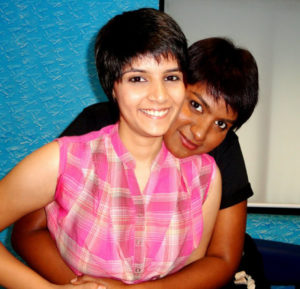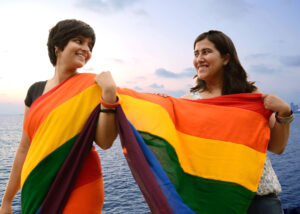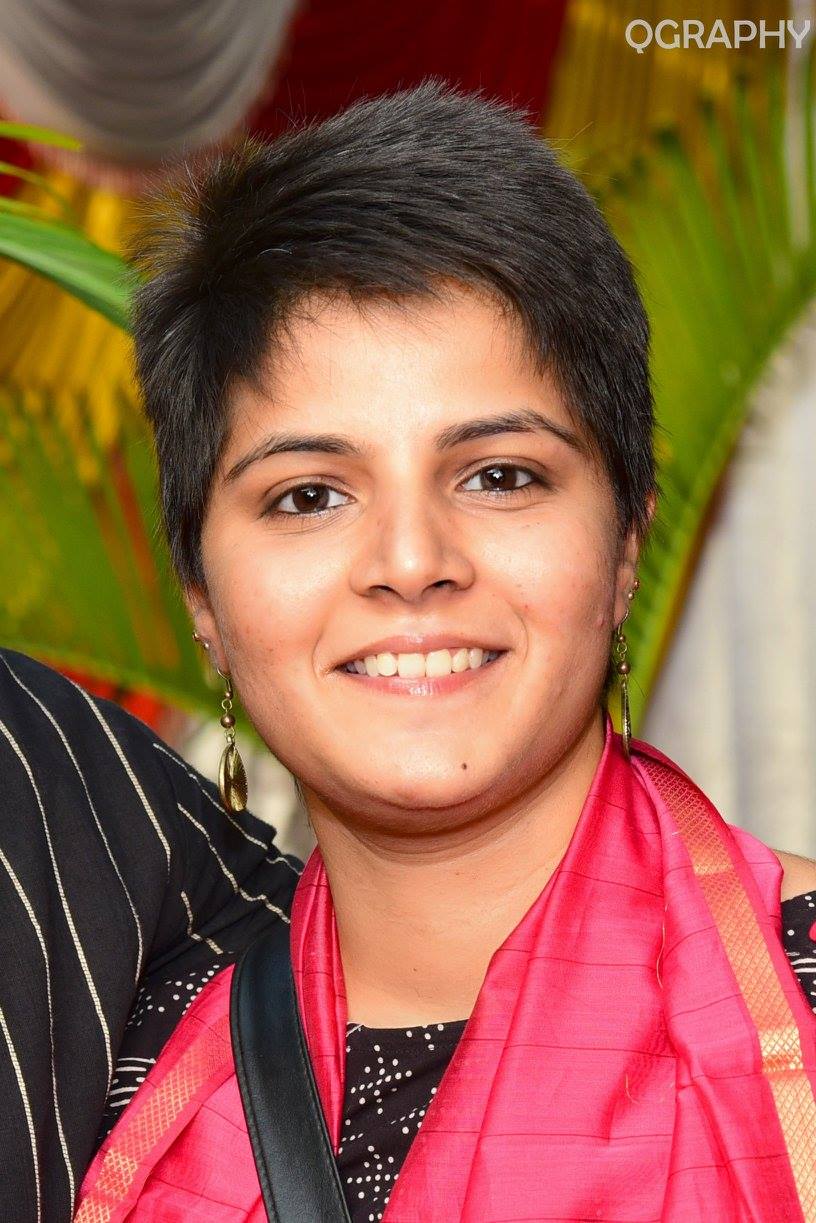Interview by Apphia K.
The first time we met, in July 2009, we were celebrating the decision of the Delhi High Court to decriminalize same-sex acts. I had been invited to speak and represent the bisexual community and had driven about 125 miles that morning, brought a custom-made 16-foot-long bisexual pride flag with me and was nervous. The flag hung from the roof of the high-rise metal shelter under which we had gathered that rainy morning. The crowded space next to it slowly emptied. Even the friends who had driven down with me disappeared. I waited by the bi flag, with a 10-foot radius of empty space around me, for another bisexual activist, L. Ramki, to join me. He was flying in from Chennai for moral support and to bear witness to the event. A young person came up to me and asked me what the flag was. She broke into a grin and said that she was bisexual too! She introduced herself as Sonal Giani.
On October 11, 2011, Sonal and I created a group on Facebook called BOZ. It was magic to watch people adding each other, and those people adding more bisexuals they knew. We were so happy that we had found our community. That was five years ago.
AK: What has it been like, being bisexual and visible in India?
SG: When I met the LGBT community initially, I experienced phobia when people learned I was bisexual – being ambiguous about it was better. You were one of the first people I knew who openly identified as bisexual. I remember that you were at the Queer Azaadi Mumbai event with a big Bi Pride flag. It was natural for me to come stand with you. I felt a strong sense of belonging under that flag. Once I had that affirmation, I felt more confident to identify as bisexual.
I remember coming to your party in Pune way back when. There was a pretty girl there with a guy. I noticed her noticing me so I went to talk to her. I asked her if she was bisexual. She stared at me for a moment, then firmly stated that she was bisexual and that this place was for everyone! I think she thought that I was cute right until that moment. I found it funny but good at the same time, and glad that it was a safe place. I like the way she “handled me.” After that incident and party, I felt like I could identify as bisexual again.
At the Integrated Network for Sexual Minorities Conference, we were on a panel together and you talked about biphobia and gaywashing (when a bisexual person does something and then that act or person is identified as gay by the media or the community at large). I realized that someone was articulating these issues for the first time. That was a turning point for me; it resonated with me. You and I were the only people who were openly identified as bisexual at that conference. I felt like the bisexual movement didn’t really exist here earlier and I had yet to meet people in my immediate community who would speak about bisexuality. When we created BOZ I didn’t expect more than 10 people to join up. We grew so rapidly! Overnight, we had grown to 150 members.
At the AMALTAS summit in 2012, I remember speaking about poly relationships, bi invisibility, the right to marry, not wanting the right to marry and how it affected our bisexual community. We did an online focus group discussion with 20 people who were talking about the bi community. I felt like I was way ahead of my time.
Looking back, I realize that even though it seemed like we weren’t doing enough back then, we were creating history.
AK: What has your experience been like ‘coming into’ the community, through a bisexual lens?
SG: I prefer using the term ‘communities.’ We’re activists, party goers, a social community, etc. My “coming into community story” was specifically a coming into an activist community. Seven years ago I wouldn’t have imagined being where I am. At Humsafar Trust (one of the largest non-governmental organizations in Mumbai that creates spaces for LGBT people) I was always invited to the table. They ensured that the bi community was represented and given independent spaces in which to exist.
My experiences at parties and dating haven’t been nice. I’ve had people not wanting to talk to me when I came out as bi. Assumptions were flung. Partners had insecurities and promiscuity came along with the label. I have identified as ‘queer’ to avoid the biphobia. The word ‘queer’ is great, but we shouldn’t hide behind it… I’m trying to use the positivity that I’ve found in the activist space to influence the dating/ social world.
AK: It used to be difficult to be bisexual in India. When we first started BOZ, it was very active but seems to have gone quiet. But! There seem to be more of us now than before. What in your opinion has changed for bisexuals in India?
SG: BOZ is proof that we have been around for a while now. They can never take that away from us. We used it as a space to tackle biphobia in our communities but didn’t do anything offline; that’s what hurt us. There is a lot more bisexual presence in offline groups.
My being visible has definitely changed things for the bi community in Mumbai. In the last six years, I’ve seen more bisexual women being out and visible. I see them in Yaariyan and other youth groups, and I see a strong presence of bi women in leadership positions. Bisexual men are slowly becoming more visible, which is a great change to see and experience. They are far behind the women in the movement, and that’s the reverse of what we see in the gay community, and I wonder what that means.
We are actively addressing and fighting biphobia and that is creating space for people to come out. When you see someone challenging biphobia, it helps. When one of your friends is out as bisexual, that helps too!
We now have people demanding bi inclusion in queer spaces and in a lot of assumed non-queer spaces, people are coming out about fluid sexualities, pansexuality and bi curiosity. We’re seeing people embrace these other labels. There are more people talking about biphobia in various forums. I get tagged in conversations where people are challenging biphobia… and I get tagged when the person has stopped making progress.
Even today, if a bisexual woman is forced to get married and she leaves her same-sex partner to marry a man, the community alienates her, cutting her off, simply because she was forced into another path. We’re harsher on queer people who have an opposite gender attraction. There is a pressure on bisexuals to prove monogamy and I don’t understand why that’s on us!
A lot of people have tried to conveniently erase our history. Raja Rao erased the work you did in Pune, in an article I read – he wrote about older groups but very conveniently erased the Youth LGBTQ Movement and Bisexual Movement that you had created – which at the time was one of the largest, most active groups. We, groups like Yaariyan, came after that. The only way to counter that is to be so visible that they cannot erase us!
AK: What are you working on now, community-wise?
SG: I’m taking a bit of a sabbatical;. Self-care is my top priority. I feel like I’ve been in a bubble. I want to meet people outside Humsafar Trust (HST) and expand my horizons. I want to get back to my first love – working in film. There is very little content on film about bisexuals. I would like to tell stories through film and document bi history. It is something I have to do. Left to the others, we will be erased from history and I want to make sure that I do something about it.
AK: You recently left HST. What have been some of your greatest accomplishments and challenges?
SG: HST was my strongest support system. There, I learned how to stand up for myself. I saw people who were visible, representing the community with the media. It gave me a sense of Pride. There are a couple of biphobic people there, but they don’t represent the organization. In my experience HST is bi-friendly and has created a very accessible space. There were jokes made, I was called a lesbian – but I kept correcting them. I appreciate that they stayed engaged and took the time to understand that there was something more here. I value that I was challenged while we delved into the challenges of what the bi identity means.
Luckily, that girl at your party taught me to have thick skin to be able to take it on!
Over the years, Sonal has become one of the most recognized, visible and inspiring activists on the ground in India. She has previously worked with Humsafar Trust. She is a part of Umang – a support group for lesbians, bi women and transpersons and is the founder of Yaariyan – a youth group for LGBT people. A filmmaker at heart, Sonal has played a pivotal role in Kashish, an LGBT Film Festival in Mumbai, and produced a Marathi play called Ek Madhav Baug. She has starred in Connected HumTum, a popular Indian TV show and W, a Bollywood film. Sonal is also featured in Purple Skies, the first LBT Documentary to be broadcast on public television!

Apphia and Sonal
A warrior, survivor, the voice in the room reminding it to be bi affirming and inclusive, a hugaholic, a poet who loves to sing, Apphia Kumar refuses to tiptoe around biphobia and bi-erasure. To her knowledge, she is the first person to be granted asylum in the U.S. as a bisexual person and, in addition to her work with SALGA-NYC, she is working on creating more AAPI bisexual spaces and on immigration issues through the bisexual experience.

Sonal in a rainbow saree with her partner at a shoot for Purple Skies (2014)

